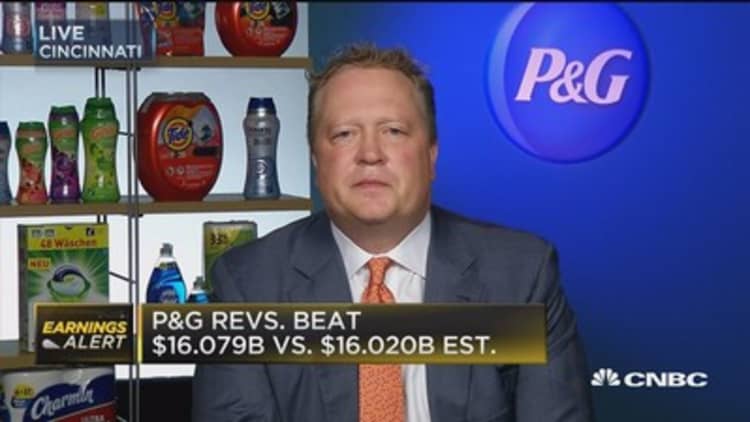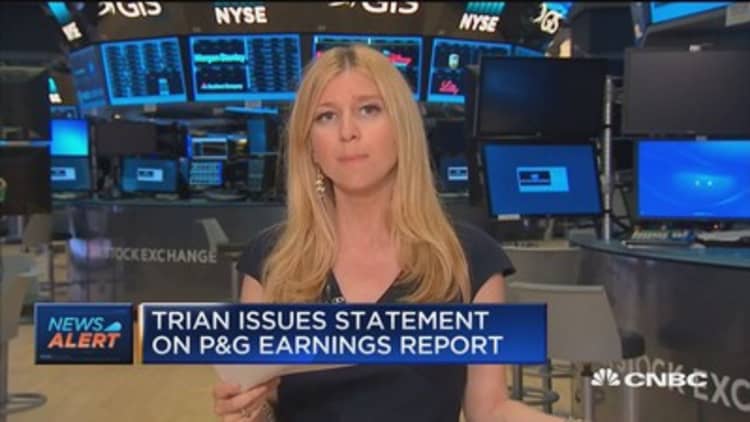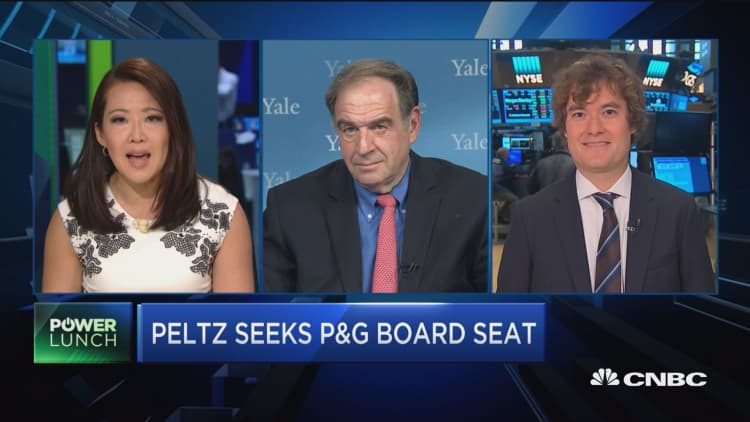
Procter & Gamble, the maker of Pampers diapers and Crest toothpaste, reported fourth-quarter earnings and sales Thursday that topped analysts' expectations. The company is aggressively cutting costs as part of its plan to reinvigorate growth.
Here's what P&G reported vs. what Wall Street was expecting:
- Earnings per share: 85 cents adjusted vs. a forecast for 78 cents, according to Thomson Reuters
- Revenue: $16.08 billion vs. an estimate of $16.02 billion
P&G has been under increasing pressure by Wall Street to reverse lagging sales and speed profit growth. Earlier this month, billionaire hedge-fund manager Nelson Peltz called P&G a "suffocating bureaucracy." Peltz said he's seeking a board seat at P&G after the company rejected his request for one following months of meetings.
Peltz's Trian Fund Management owns about $3.3 billion worth of P&G shares, according to the hedge fund's latest filing with the Securities and Exchange Commission. Notably, Peltz has been involved with numerous other turnarounds of consumer-focused brands, such as Heinz.
After P&G posted its earnings results Thursday morning, Trian issued a letter criticizing the company's performance compared to peers.

"Over the past 10 years, P&G's total return to shareholders is less than half that of its peers and it has been in the bottom quartile over most recent time frames," Trian said in its statement. "Trian believes P&G needs to address the root causes of this consistent underperformance, including deteriorating market share across most of its categories and excessive cost and bureaucracy."
Peltz has said he's looking to ensure greater "management accountability" at P&G, where he wants to "accelerate positive change." However, Trian hasn't detailed any specific plans of attack nor strategies to achieve said results.
By Thursday afternoon, P&G CEO David Taylor called Peltz out on this.
"I want to prevent anything from derailing the work we're doing," Taylor told CNBC. "The fact that he has good advice doesn't mean we just add him to the board."
P&G's plan to please Wall Street has been to trim unprofitable brands from its portfolio, and to cut as much as $10 billion in costs from the business over the next five years.
"We went from 16 categories down to 10... 170 brands down to 65," Jon Moeller, Procter & Gamble CFO, said on CNBC's "Squawk Box" Thursday morning, discussing the latest quarter. He said P&G is seeing progress and that the company is focused on improving into 2018.
"I truly believe the best days of our company and [for] the consumer-products space are ahead of us," Moeller said. "We are in the middle of the biggest transformation ever as a company."
In the latest quarter, Cincinnati-based P&G managed to drive costs even lower, which aided in boosting its profit; P&G's net sales remained flat at $16.08 billion, though the company's quarterly profit climbed 13.5 percent.
Selling, general and administrative expenses fell 7 percent in the quarter.
Net income rose to $2.22 billion, or 82 cents a share, from $1.95 billion, or 69 cents per share, one year ago. Excluding restructuring charges and the results from discontinued operations, P&G earned 85 cents, outpacing analysts expectations of 78 cents a share.
The company's total organic sales — which excludes the impact of foreign exchange, mergers and acquisitions — grew 2 percent on a 2 percent increase in organic volume.
"We met or exceeded each of our going-in objectives for fiscal year 2017 in a challenging macro and competitive environment," CEO Taylor said in the earnings release.
"We made significant progress on our key priorities: accelerating organic sales growth, continuing to drive strong productivity improvement and cost savings, strengthening our organization and culture and completing moves to simplify and strengthen our product portfolio."
Bright spots, and thus sales drivers, in P&G's portfolio for the quarter were in beauty and fabric and home care. Both of these segments saw their organic sales climb 5 percent from a year ago. In beauty, P&G said its skin and personal care products grew sales in the high-single digits, aided by more innovation.
P&G's grooming and health-care segments saw their organic sales fall 1 percent from a year ago. Pricing pressure in the shave care and oral care categories is what drove results lower during the quarter, the company said.
Looking ahead, P&G said it expects earnings to grow 5 percent to 7 percent in 2018, also warning that the first quarter of fiscal 2018 will be the "lowest organic sales and core EPS growth period of the year."
Headwinds from "portfolio choices" and the a recent reduction in Gillette prices across the U.S. are the primary reasons for tough first quarter, the company said, but cost savings are still expected to build as 2018 progresses.
PG year-to-date performance
Source: FactSet
Shares of P&G were recently trading up less than 1 percent. The company's stock has underperformed the market in 2017. As of Wednesday's close, shares of P&G have climbed about 5 percent over the past 12 months, and the stock is up about 6 percent for 2017. This, compared to the S&P 500's roughly 11 percent growth since the start of the year.
Some analysts, though, are now saying the stock price should improve as P&G returns to "industry growth rates." Better performance in beauty, grooming and fabric and home care are helping the company, as evidenced by organic sales in those divisions coming in better than expected for the latest quarter, Jefferies analyst Kevin Grundy wrote in a Thursday note to clients.
"We believe shares should trade higher," Wells Fargo analyst Bonnie Herzog echoed this point in a Thursday note to investors.
"While results likely don't shake activist pressure, it's a sign that management has the right strategy in place," Herzog added. "That said, choppy execution and a multi-year trend of slow organic sales growth keeps us on the sidelines in what will likely be a long-term turn-around."
WATCH: Peltz's complaint is wanting P&G to move faster



